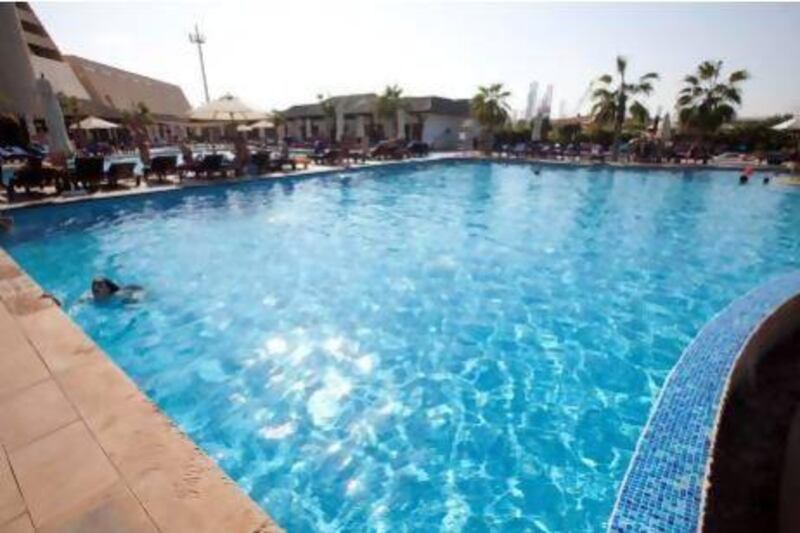SHARJAH // Residents of towers with swimming pools are asking the municipality to intensify inspections to ensure they meet safety standards.
One tenant, Nour Omar, said her building's pool was so dismal she took her children to a nearby club.
"The water smells a lot of chlorine, the ladder has been broken for several months and never repaired. Nothing is well regulated there," she said. "There is no emphasis on wearing a swimming cap and privacy for women is not good."
The rent at her tower is more expensive because of the pool, which is considered a "luxury amenity". But this is not reflected in the service received, Ms Omar said.
Zayenab Al Sayed, a supervisor at a residential swimming pool, has noticed problems at other facilities.
"The main violation residential swimming pools have is not changing the water for a long time - not even when it changes colour," she said.
Swimming in improperly treated water can result in rashes and skin diseases, she added.
"Some swimming pools just add a lot of chlorine in the water and this is equally dangerous," Ms Al Sayed said. "[And] residents violate safety standards by not taking a shower before going into the pool."
Shatha Ali Al Mualla, director of the public health department at the municipality, said there were 48 licensed swimming pools at hotels in Sharjah, 20 at health and sports clubs, 22 at private schools and nurseries, and nine at ladies clubs, Sharjah University and the American University.
The authority is strict about licensing pools, Ms Al Mualla added.
A list of standards must be met, including having a central filtration and recycling system, depth markings, toilets, showers and lockers.
A qualified lifesaver must be on duty at all times with lifesaving equipment on hand, safety notices must be displayed and a first-aid kit should be available.
The owners are expected to keep records of maintenance and cleaning and present these to inspectors.
Last year, Ms Al Mualla's department carried out 150 inspections and found only 27 breaches.
"Every swimming pool is visited at least every six months," she said.
Inspectors also take water samples to check their safety and compliance with chlorine ratios. If a problem is found, the facility is closed until the issue is rectified.
Pools considered to be doing a good job are the four on offer at the Radisson Blu Resort in Sharjah.
"Because of their safety reputation they are almost always at full capacity," said sales manager Ravi Prakash.
Not having a trained lifeguard at a swimming pool in Sharjah can lead to the closure of the facility.
Ms Al Mualla said inspectors were working constantly to ensure all pools had lifeguards at work.
"Action will be taken against any facility without lifeguards, beginning with a strict warning, a penalty or temporary ban from operating until the situation has been corrected," Ms Al Mualla said.
All lifeguards in the emirate should be licensed by the Health Control department, to ensure they have a good knowledge of lifesaving procedures.
While most hotels have lifeguards, a number of residents of towers with swimming pools said they had no dedicated lifeguard. Instead, watchmen monitor the pools as part of their rounds.






